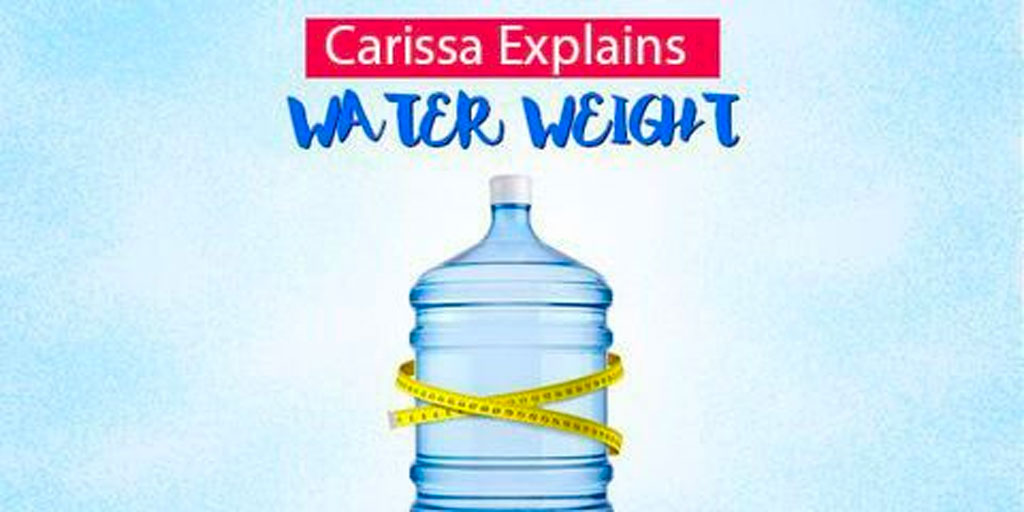What do water retention and water weight have to do with weight loss goals?
Have you ever had the unsettling experience of stepping on the scale in the morning and discovering you’ve gained 3 pounds overnight? No, you didn’t “fatten up” while you slept. In fact, it’s nearly impossible for those 3 pounds to be fat. To gain 3 pounds of fat in one day, you would need to consume more than 10,000 extra calories! That would really be pushing it for anyone (with the exception of Thanksgiving perhaps)! Rather, while you slept, your body retained 3 pounds of water. It is the water weight that you’re seeing on the scale.
What causes water retention?
Simply put, salty foods, excess sugars (carbs), and even dehydration can all trigger your body to carry that excess water weight! Every 1 gram of carbs requires 3-4 grams of water to process and store it within our body. Even though water is essential for the body, retention of that water … not so much. Approximately 50-60% of our total weight consists of water. Water is involved in all body functions and staying properly hydrated affects every body process from the condition of your skin to the recesses of your innermost cells. Retaining water means you are carrying extra water around in the tissue between cells.
For women, water retention is always more complicated. Most women know that retaining water weight during a certain point in our cycles is just part of life. The amount of water weight gained varies — sometimes as much as 10 pounds. Hormonal contraceptives, NSAIDS and some heart medications also affect your water retention. Stress also contributes to water retention because stress triggers the adrenal gland to overproduce cortisol. Elevated cortisol levels can lead to rapid weight gain (Cushing syndrome). Stress causes us to puff up simply because when we are stressed, we tend to seek relief by eating high-carb, high-sugar or high-salt meals. If weight loss is the goal, this is the wrong way to do it.
How to lose water weight safely and effectively
Cut down on sodium. Since sodium plays a major role in water retention, cutting down on it will provide drastic results. So will eating foods high in potassium, whether it be from green vegetables such as spinach, chard, and broccoli, and fruits such as cantaloupe and apricots.
Stay away from laxatives and diuretics which may cause electrolyte imbalance and often lead to drowsiness, fatigue, muscle cramps and dry mouth. They are merely a quick fix and give temporary results.
Steer clear of processed foods or foods like cheeses, soups, or cold cuts that are available in the deli. If you must have something processed make sure to look at the nutritional values and choose an option with low-sodium. Avoid drinking juices.
Eat enough protein and fiber. Protein plays an important role in maintaining fluid. If you are protein deficient or don’t eat enough fiber throughout the day this may also cause your water weight to increase. Fiber absorbs large amounts of water as it moves through the intestines, reducing water weight.
Stay active. Many of us work a 9 to 5 job and find all of the excuses to not hit the gym or to go outside for a 30-minute walk, but this is where physical inactivity comes into play. Physical inactivity can lead to water retention as well as swelling, especially in the feet and ankles. A balanced diet, staying hydrated and exercising regularly will go a long way toward flushing out excess water and those water weight pounds.
Drink more water. It may sound counterintuitive to drink more water when you are retaining water weight, but it may be the key to helping you rid your tissues of excess water. It is recommended to drink 25 to 50 percent of your body weight in ounces each day. If you’re looking for a way to incorporate more water into your daily routine, try drinking a glass of water before each meal and snack. Drinking more water will relieve any dehydration you have, which may be causing your body to store any water it can find into your tissues as a reserve. Drinking more water will also help flush out any excess sodium you may have in your body.
A note on losing water weight when you begin a low carb diet … If you have just started a calorie-restricted diet and are beginning to exercise regularly, you may have noticed that the pounds are coming off incredibly fast, somewhere between 5 to 10 pounds. This is because your body is burning off stored carbohydrates called glycogen. Since carbohydrates love water, that means they release water as they are burned off, dropping water weight. After the first few days, this may not be the case because you have burned those stored carbohydrates and now your body has turned to the second source of fuel: body fat. Weight loss at this stage will be slow but steady and over time, stepping on the morning scale will make you smile, not cry.


